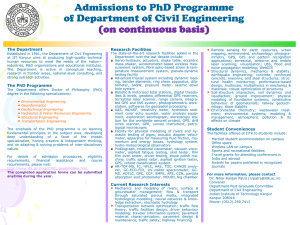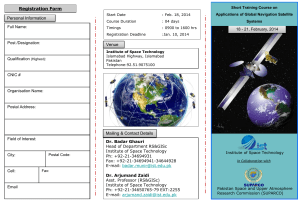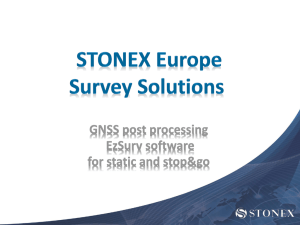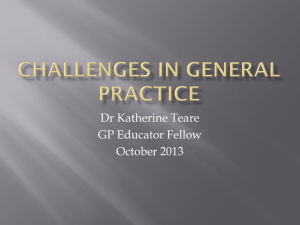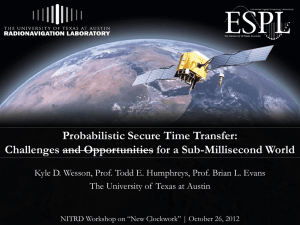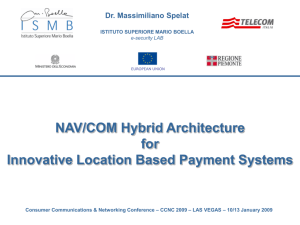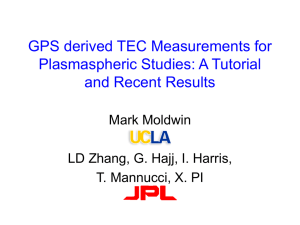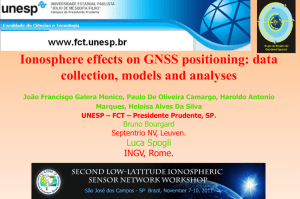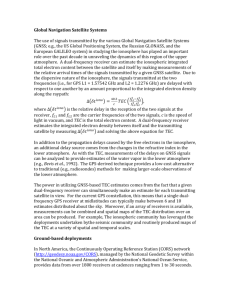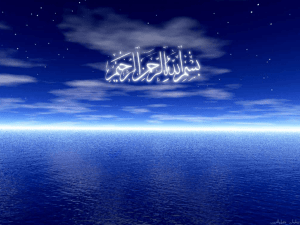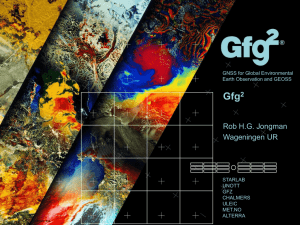4_3_AMORY
advertisement
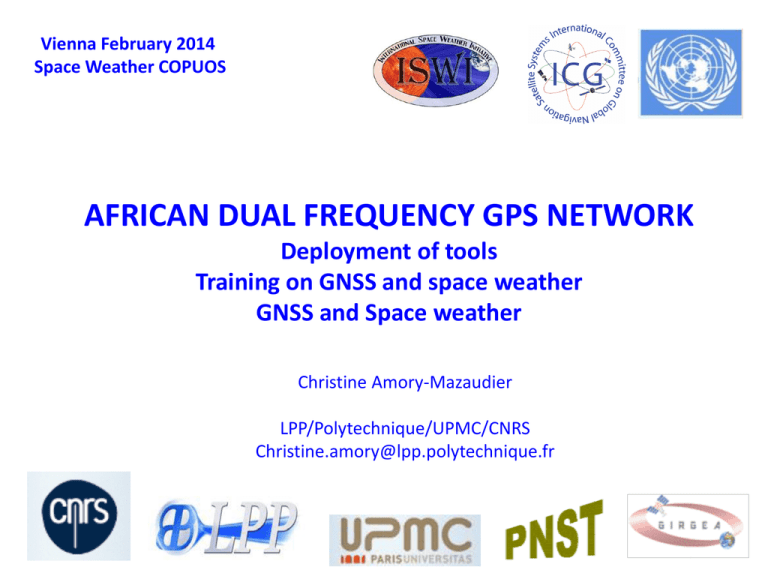
Vienna February 2014 Space Weather COPUOS AFRICAN DUAL FREQUENCY GPS NETWORK Deployment of tools Training on GNSS and space weather GNSS and Space weather Christine Amory-Mazaudier LPP/Polytechnique/UPMC/CNRS Christine.amory@lpp.polytechnique.fr Introduction UNBSSI [1990-2012] United Nations Basic Space Science Initiative • IEEY: International Equatorial Electrojet Year [1992-1994] • IHY: International heliophysical Year [2005-2009] http://www.ihy2007.org • ISWI : International Space Weather Initiative [2010-2012] http://www.iswi-secretariat.org Since 2013 French National Program PNST http://pnst.obspm.fr/Meteo_espace/ Scientific Associations : IAGA, SCOSTEP, COSPAR DELOYEMENT OF GNSS RECEIVERS • not only GPS -> GNSS • Research and applications GLONASS K1 GPS IIR GIOVE-B BEIDOU Provided by T. Tsugawa (NCIT, JAPAN) JAPAN Region # of GPS Rec. ~1,200 receivers N. America ~2,700 receivers Europe ~1,200 receivers Detrended TEC Map (60-min Window) 4 January 2010 IGS http://sopac.ucsd.edu http://cddis.gsfc.nasa.gov http://igs.ensg.ign.fr AMMA stations are now in IGS NOAA et UNAVCO http://www.ngs.noaa.gov/CORS http://www.unvaco.org November 2013 Main provider : AFREF Free on the web Many networks of GPS Burkina Faso, Algeria, Egypt, Rwanda etc… Necessity to share -> Work of the AGS The satellite signal is strongly modified by ionosphere and troposphere TEC LAYERS > 600 km EXOSPHERE few collisions, Particles follow balistic orbit 80-600 km THERMOSPHERE Ionization by the solar X-EUV radiation IONOSPHERE 30-80 km MESOSPHERE Absorption of the radiation UV by the ozone layer 11-30 km Turbulence There is a strong interest to use GPS for meteorology STRATOSPHERE 0-11 km TROPOSPHERE Meteorological phenomena Equatorial Fountain : map in East Africa now possible Amory-Mazaudier et Fleury, 2013 ISWI : very successful project => we have to continue Objective 1 – Map of TEC / Bangalore 2006 Objective 2 – African scientific Leaders / Ethiopia 2007 Leaders in : Nigeria, Côte d’Ivoire, Kenya, Egypt, Burkina Faso, Algeria, Morocco etc… 1st President : Prof Babatunde RABIU Uses of GPS Water vapor Motions of Earth TEC S4 Motions of ocean Water vapor Training - Research -> ISWI GIRGEA (26 countries /13 in Africa) Europe -Africa + Asia + America • • • • • • Capacity Building 25 PhD -> 1992-2013 15 PhD -> 2007-2013 (IHY and ISWI) 10 countries ( Africa (5) – Europe (2)-Asia (2)) Actually 30 PhD in progress GNSS is a tool for research and development GNSS MASTER -> UN SCHOOLS in MOROCCO and NIGERIA MAGHREB ISWI SCHOOL - each 2 years School each year Egypt Workshop on Space Weather Nigeria each year PERENNITY • Need of International cooperation • Need of tools in Africa (GPS, magnetometers, radars etc…) • Schools are very important -> to attract PhD students. • Programs of exchange (PhD and post doc) => Need of mentors • African countries in International scientific associations as SCOSTEP, COSPAR URSI • Next AGS meeting at Abuja in June 2014 RESEARCH 2003/10/28 : 11h12 X17.2 1 2003/11/04 : 19h48 X28 2 2003/10/28 : 11h12 2003/11/04 : 19h48 SOHO Extreme ultraviolet Imaging Telescope (EIT) of the fourth largest (1) and the largest solar flare (2) STUDIES OF EVENTS : SOLAR FLARES Sun Earth distance : 8 minutes Liu et al, 2006, Solar flare signatures of the ionospheric GPS total electron content, JGR, vol 111, A05308 Signature of TEC storm on 6 november 2001, Maruyama et al., 2004 JGR, Vol 109, A 10312 Large network of GPS stations Real time Units = 1x 1016 el/m2 EXB Quiet days DTEC = UT + 9h First PhD in Spain 1992 Observatory of Ebre -J.J Curto 1 2 3 4 1 : the solar flare 2.: ionization => DTEC From Curto ‘s PhD 1992 3 : Ionospheric electric current densities 4 : Magnetic signature of the solar flare Solar flare -> black arrows Curto et al., JGR, 1994 Sun CME departure Transport CME arrival Magnetosphere Magnetosphere- Ionosphere-Thermosphere coupling Auroral zone DEVELOPMENT OF MODEL AND TOOLS FOR DATA ANALYSIS ARRIVAL NEAR THE EARTH Direct driven process/DDP No shielding Loaded driven process/RC PPE Shielding Overshielding Penetration of auroral electric fields at equator during a substorm, Kikuchi et al., 2000, JGR, Vol 105, N° A10, 23251-23261 CONNECTION HIGH AND LOW LATITUDES : Electric Field DP2 : Nishida, 1968 Richmond/ school in Algeria 2013 - TIEGCM model simulation ASSIMILATION OF DATA Electrodynamic coupling of high and low latitudes observations on May, 27, 1993 Kobéa et al. 2000, JGR, Vol 105, A10, 22979-22989 PPE Richmond and Kamide, 1988 JGR vol 83 n°A6, 5741-5759 AMIE CONNECTION HIGH AND LOW LATITUDES : Neutral wind Robble 1977 Richmond/ school in Algeria 2013 – numerical simulation EFFECTS OF ELECTRIC FIELD AND NEUTRAL WIND Richmond/ school in Algeria 2013 – numerical simulation RESEARCH => SYSTEMIC APPROACH from the ground to the sun a fisrt necessity TRAINING: Schools on space weather and GNSS => global approach ANALYSIS OF EXISTING DATA BASE : many PhD Assimilation of data in model DATA BASE OF SIMULATION: All the cases analyzed can be used later AFRICA: To continue the deployment of ground based instruments over Africa Capacity building in Africa => need of Mentors OPERATIONAL SPACE WEATHER : Researchers produce knowledge and data
